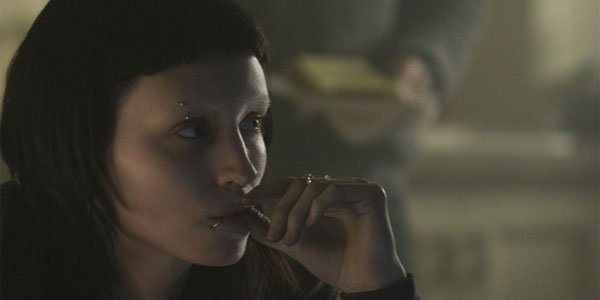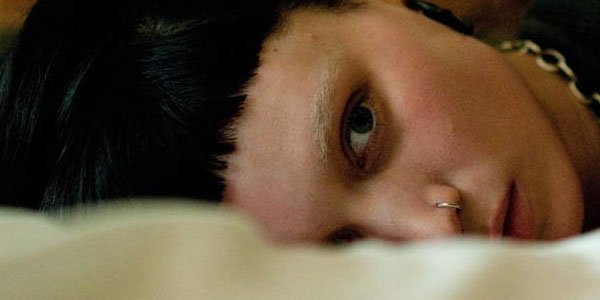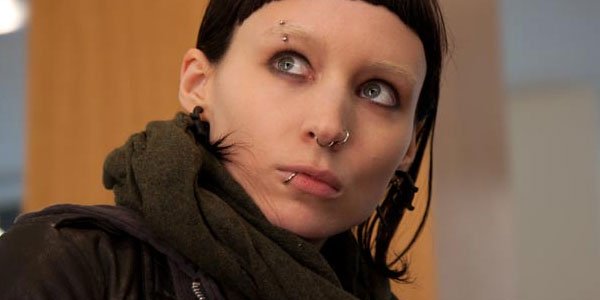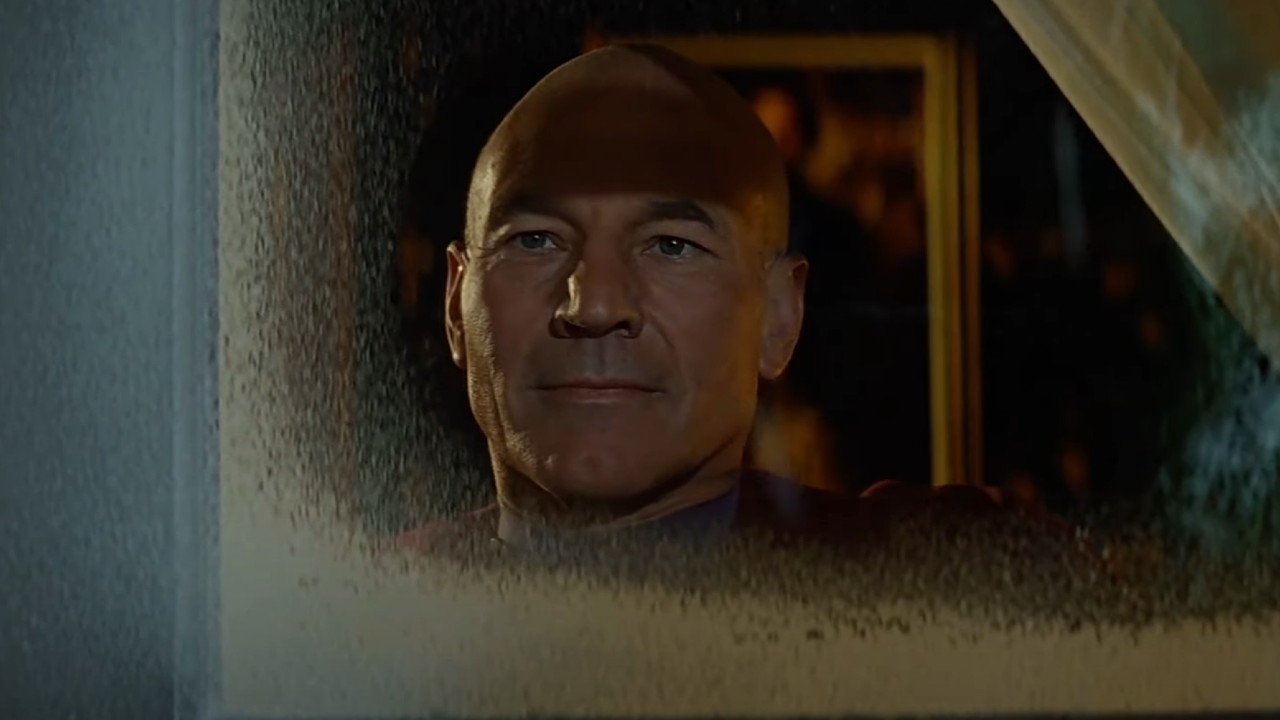Dragon Tattoo Star Rooney Mara Talks On-Set Bruises And Becoming Lisbeth Salander

"I couldn't imagine my life without doing it."
That's how Rooney Mara describes a realization she had midway through the lengthy audition process for The Girl With The Dragon Tattoo, David Fincher's new adaptation of the hugely popular Stieg Larsson novel. She doesn't go so far as to attribute the casting to fate-- she worked far too hard in the auditions for that-- but it's hard to deny there's something amazing about the whip-smart, highly verbal girl from the beginning of The Social Network transforming herself into the dark, repressed and furious Lisbeth Salander in Dragon Tattoo. Dyeing her hair black, bleaching her eyebrows and getting several piercings was only the beginning of the sacrifices made for Dragon Tattoo, which shot for 150 days and had her living in Stockholm on her own for weeks before production began, in order to understand the character better.
By all accounts every sacrifice paid off-- even the film's weaker reviews single Mara out, and though she says she's "shot myself in the leg" in finding equally worthwhile projects to do next, she's suddenly a very big deal when a year ago few people knew her name. I talked to Mara-- still with the black hair, though minus the many piercings-- over the weekend about how Salander's physical appearance bled through into her own life, the "character flaw" she shares with Lisbeth, the relationship she and David Fincher built together, the bruises she took home from set, and the one scene that Fincher, notorious for his many many takes, tried to get done as quickly as possible.
Take a look below, and see The Girl with the Dragon Tattoo in theaters everywhere this weekend.
How do you go into a role that's this challenging and know that it's going to be worth it in the end?
I didn't know. When I got that list [of what would be required in the role] from David after my first audition I hadn't read the books yet. I didn't want to read them until I knew I had a good shot at it, because I know myself and I can get very obsessed with things. I know that's how I work, and I knew it'd be that much more devastating to read the books and fall in love with this character and not be able to play it out. After I got the list I was like, if I don't get this, it's OK, because it's going to be really hard and I don't know that i want to go through that. Then after I read the books, as I knew I would be, I knew I had to do it. I couldn't imagine my life without doing it. I kept telling a friend, "I think I'm going to get this movie, because I actually can't imagine my future without it." It's just kind of a weird instinct, I just knew i was right.
In the press conference you said it was refreshing to walk down the street after a day of shooting with your black hair and piercings and have nobody pay attention to you. Can you elaborate on that?
Your Daily Blend of Entertainment News
There's just a certain amount of attention you get as a girl, when you've got sort of long, pretty hair. I've never been someone to play up my sexuality with my wardrobe, I've always sort of played it down, but regardless as a girl there is a certain attention you get. When you have a weird haircut and no eyebrows and lots of piercings and you're dressing like a boy, people don't look at you, and I found it to be so freeing. To just roll out of bed in the morning and not worry about what you look like.
And I assume you've had the experience everyone has in New York, where you're not wearing anything special and you get catcalled anyway.
Yeah, no one catcalls you when you look like I did.

You were in Stockholm on your own for a few weeks before filming started. How did that contrast to what then happened on set when you're really micromanaged, being shepherded back and forth and fed and everything.
That doesn't happen on a David Fincher set. And people don't do that to me because they learn very quickly that I hate that. They always have an airport greeter for me when you're doing something for Sony, and all the airport greeters have learned "Alright, you're OK, we're going to leave you alone now." I don't do well with a handler, and certainly not when I'm in character. People knew to stay away from me.
How did you let people know you were in character?
It's kind of just a part of me. It was certainly heightened when I was in character. It's quite clear in body language. Sometimes you get a person who doesn't read body language very well. But there's none of that. Shooting a Fincher film is very much like shooting an independent film, without stressing about getting your shots in. You have an endless amount of time, but it's an independent film in the fact that there are no producers on set, there's no bells and whistles. He likes everything as contained as possible. The money is on the screen.
There's a contrast between the famous Fincher method of taking an endless amount of time for shots, and the way that people shoot tough scenes, where you want to get into a scene and get it right early and get out of there. Did you try to nail it early and get it over with, or did you just know that you might have to do 40 takes of a rape scene.
You just know. You're always giving it your best, but you know that you have time to breathe, so it doesn't have that sort of panicked feeling, that I have four shots at this. You get to really play. The only scene where there was less of that, when we went in saying we've got to get this right, was not even the rape scene, but the scene leading up to the rape, when he chokes me out. That was really, really fucking hard. David came up to us before that and said "I'm going to try and do this six times." We did it much more than six times, but we all went in knowing there was a limited amount of takes we could get at that.
Because of the physical toll it took on you?
Yeah, after that first day of doing the choke-out part, I went home, and I can't remember who was there, but they thought I was in makeup. They thought I had the post-rape makeup on. I was really getting choked out. You can't really fake that-- we weren't faking that. So certainly on that scene we went into it with 100% on every take, and we tried to get it over with as fast as possible.
The book occasionally describes Salander as being weird looking and strange but also attractive. The movie seems very uninterested in that. Is that something that you and David discussed or that came up with the costume designer, trying to make her as unsexy as possible?
Yeah, she's meant to look like a little 14-year-old boy. Her look to us was always meant to repel. It's alway meant to be a means to get the kind of response that I got, people don't pay attention to you, they don't have expectations of you, they just ignore you. We certainly didn't want her to be sexy or attractive in any way. I think by the end of the film she is beautiful. I think a lot of people before they see the movie think "God, she's so ugly, why would they make her so ugly." I think those people will leave the film thinking she's beautiful.
Did you want to get that shocked reaction out of people?
It's not the reaction we wanted, but it's the reaction we knew would happen. It's the reason David always talks about E.T. If you just saw E.T. before the movie you'd think "That's an ugly little creature." By the end of the movie you're like "He's so cute!" And that's sort of what happens with Salander. By the end of it she's beautiful in her own little way.

People talk about this movie and emphasize the way and David Fincher worked together. How did Daniel Craig fit into that? How much of it was the three of you putting your heads together?
Me and Daniel didn't work together that often. Certainly me and David did a lot just me and him-- we had to, a lot of my stuff is on my own. Everything was new to me, so I needed more special attention and protectiveness. We had to really be careful about this character. But there were a lot of rehearsals with us sitting around a fire.
What do you think you got out of all the time you had to build the relationship with David Fincher? Was there a noticeable difference in the relationship between when you first started shooting and the end?
Obviously, yeah, after 150 days of shooting I probably know way too much about David, he knows way too much about me. Certainly by the end of it he knew how to push my buttons better, and what I needed when I was tired at hour 16. I'm very slow to trust people and slow to warm up to people-- it's one of my character flaws. I don't know, there's something about David, I immediately trusted him. Kind of the way Salander almost immediately trusts Blomkvist. And that's sort of how I felt about David. I just knew to trust him, and I couldn't have made the film without that, because there was so much I had to do that required trust.
Having gone through a unique experience like this, how does it affect what you look for in the rest of your career?
It's really hard. I've set the bar high. I've kind of shot myself in the leg a little bit. But again, I feel like David from early on empowered me to have an opinion and to have a choice. At the same time that's been very helpful in the way I look at things. I want to work with other directors who have a strong point of view and who are uncompromising in their method of filmmaking. That's really important to me after working with David. And also script is really important. I'm really ready to start working again, but I don't want to work on anything that I'm not equally as passionate about.
I'm a workaholic, so I have to just work. If I'm not working I'm quite miserable. It helps me to have something to focus on, and i just really like working really hard. But at the same time, from Social Network to Girl with the Dragon Tattoo I didn't work once, because I didn't get cast in anything-- certainly there were things I went out for that I really wanted that I didn't get. But I wanted to be picky and not work unless it was something I was really passionate about.
Staff Writer at CinemaBlend

